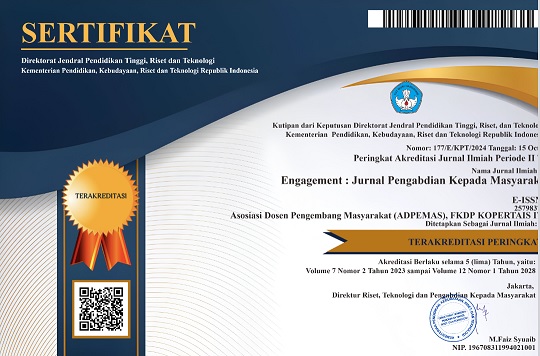Guruku Sayang, Guruku Berkembang
Problem Mapping Model dalam Proses Pengembangan Pendidikan Anak Usia Dini (PAUD)
Abstract
Early Childhood Education Development (or PAUD in Indonesian) is essential in today’s world. A participative action research (PAR) approach was one of the actions done to support the development. One important stage in PAR is the preliminary study stage. The focus of this research is to know how the preliminary study was done in the perspective of problem mapping. The data collection techniques are performed with observations, surveys, documents, and interviews. This research produces a problem mapping model that is important in determining the problem that is used as the main agenda of mentoring to fit the needs of assistance by community priorities. The problem mapping model includes several stages: problem surveying and capturing, problem displaying, problem valuing, problem clustering, and a stage to determines the main problem for the action plan or the completion process.
Downloads
References
Bartholomew, L Kay, Guy S Parcel, and Gerjo Kok. “Intervention Mapping: A Process for Developing Theory and Evidence-Based Health Education Programs.” Health education & behavior 25, no. 5 (1998): 545–563.
Chadwick, Priscilla. “Strategic Management of Educational Development.” Quality Assurance in Education 4, no. 1 (1996): 21–25.
DH, Agung. “Anak-Anak Yang Dititipkan.” Tirto.Id. Last modified 2016. https://tirto.id/anak-anak-yang-dititipkan-byN7.
Duttweiler, Michael W. “Concept Mapping as a Program Planning Tool.” Journal of Extension 29, no. 3 (1991): 1–5.
Fadjar, A Malik. “Holistika Pemikiran Pendidikan, Ed.” Ahmad Barizi, Jakarta: PT. Raja Grafindo Persada (2005).
Forstadt, Leslie A, and Brian Doore. “Program Planning with Problem Mapping to Better Understand Need.” Journal of Extension 50, no. 1 (2012). https://www.joe.org/joe/2012february/pdf/JOE_v50_1tt3.pdf.
Hanggoro, Hendaru Tri. “Riwayat Tempat Penitipan Anak.” Historia. Last modified 2018. https://historia.id/urban/articles/riwayat-tempat-penitipan-anak-PRyKa.
Hung, Chia-Hui, and Chen-Yung Lin. “Using Concept Mapping to Evaluate Knowledge Structure in Problem-Based Learning.” BMC medical education 15, no. 1 (2015): 212.
Kementerian Pemberdayaan Perempuan dan Perlindungan Anak. Statistik Gender: Potret Ketimpangan Gender Dalam Ekonomi. Jakarta: Kementerian Pemberdayaan Perempuan dan Perlindungan Anak bekerjasama, 2016. https://www.kemenpppa.go.id/lib/uploads/list/53185-statistik-gender-tematik-2016-ketimpangan-ekonomi.pdf.
Kolb, Alice Y, and David A Kolb. Experiential Learning Theory: A Dynamic, Holistic Approach to Management Learning, Education and Development. The SAGE Handbook of Management Learning, Education and Development. Sage Publication, LTD, 2009.
Muhaimin, Muhaimin. Pemikiran Dan Aktualisasi Pengembangan Pendidikan Islam. Jakarta: Rajawali Press, 2011.
Wahyuni, Sri, Ellyn Sugeng Desyanty, and Endang Sri Redjeki. “Peningkatan Kompetensi Pengasuh Melalui Pelatihan Pengasuhan Ramah Anak Pada Taman Penitipan Anak.” ABDIMAS PEDAGOGI: Jurnal Ilmiah Pengabdian kepada Masyarakat 1, no. 2 (2018): 193–204.
Copyright (c) 2020 Engagement: Jurnal Pengabdian Kepada Masyarakat

This work is licensed under a Creative Commons Attribution-ShareAlike 4.0 International License.






.png)




